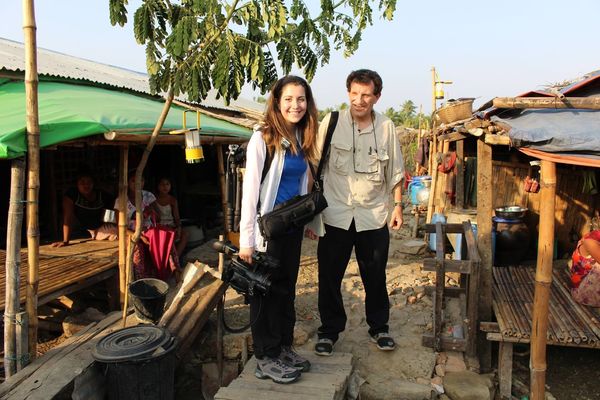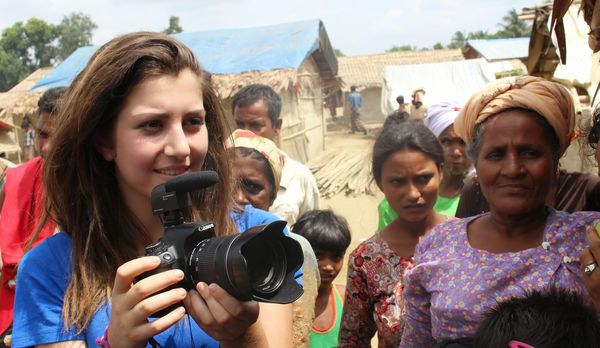
Senior Nicole Sganga spent part of summer 2014 traveling in Myanmar and reporting with New York Times journalist Nicholas Kristof after winning the “Win a Trip with Nick” contest.
While in Myanmar, she wrote and video-d her way through encounters with Rohingya Muslims living under protracted persecution in internment camps. What you might not know is what Sganga learned—and where she hopes her adventures as a global citizen will take her next.
One World
In the intelligent, open-hearted entry video that won Sganga this opportunity of a lifetime, she explores the nature of storytelling—its duties, conventions, and possibilities—and she makes a provocative comment: “Not many stories worth telling take place in a faraway land. After all, we only have one world.” Why would a budding international journalist say such a thing? Perhaps because stories are universal, and have more to do with shared human experience than with measures of geography. Insisting that every story counts, Sganga said in an interview: “We cannot rank one human story against another. We all laugh and cry at the same things, even with the challenges of translation.”
A Hesburgh-Yusko scholar double majoring in film, television, and theatre and political science, Sganga has seen a great deal of this one world. Even before she went to Myanmar with Kristof, she had leveraged her Notre Dame preparation to gain international internships at the Cannes Film Festival, the CBS News bureau in London, and in Thailand with the nonprofit HELP International.
Sganga has likewise learned much about storytelling, and while in Myanmar, she looked to Kristof for advice on how to bring this “one world” close to readers who may experience international news as stories from a faraway land. His response? “Maintain integrity while captivating audiences. We need to find the story that makes people spill their morning coffee—to make them care.”
Two Realities
It would be difficult not to care about the Rohingya refugees whose stories Sganga introduces in her blogs and video interviews. In particular, 15 year-old Khin, who attends school in the back of a makeshift pharmacy. In the video she produced, Sganga asks Khin what she wants to be when she grows up, to which Khin replies: “If I become a doctor, I can learn how to help these people.” Khin’s mother discourages her daughter’s endless studying, knowing that because Khin is a Muslim, she will be forced to quit school after 11th grade, and would be denied admittance to university even if she made it through secondary school. “I warn her,” Khin’s mother tells Sganga. “Not enough resting and too much studying is no good.”
Asked what she took away from this encounter, Sganga frowned and quoted Kristof: “Talent is universal; opportunity is not.”
In her personal essay in the Autumn 2014 issue of Notre Dame Magazine, Sganga reflects on the uncomfortable contrast between her life as a Notre Dame student and the plight of Sajan, a Rohingya woman her own age who claims Sganga’s education would ratchet her bride price up to “at least five cows . . . maybe ten.” Kristof devoted a column to this encounter, noting that despite all the similarities between the two young women, “their lives could not be more different — a reflection of the lottery of birth.”
Sganga, who comes from a family of physicians and health care professionals, admitted with a smile that her own mother worries about her career path as a journalist. Whereas Khin’s mother discourages her daughter’s medical ambitions knowing they will lead to disappointment, Sganga’s mother would prefer medical ambitions to the dangers that follow globetrotting storytellers.
New Language for Storytelling

In addition to these personal contrast experiences, Sganga found herself faced with ethical questions: whether to give a child $10 because she had it and giving it could help him stay in school; whether it’s exploitative to grab a small slice of someone’s life and broadcast it to the world; how to stay compassionate and sane in the face of stark human suffering.
Sganga—who has donated her hair four times to Locks of Love—brims with compassion. Even the research projects she undertook while studying in Washington, D.C., and London were internationally focused and socially concerned. In D.C., Sganga studied the influence of American and international media rhetoric during the 2011 Libya uprising; during a Study Abroad semester in London, she conducted research on Palestinian refugees under a professor at London School of Economics.
Asked what she plans to do after graduation, Sganga explained that while the translators she and Kristof traveled with were fantastic, serious work in international journalism requires knowledge of language. Already enrolled in Arabic courses at Notre Dame, she wants to become fluent and is considering graduate school in Lebanon, Egypt, or Oman.
“I think I need two things next,” she said. “World experience and language.”
Originally published at international.nd.edu.